- Home
- Chris Grabenstein
Mr. Lemoncello's Great Library Race Page 16
Mr. Lemoncello's Great Library Race Read online
Page 16
He could see the carton he needed riding along in the bin right in front of his.
He tried to lean forward, reach out, and grab it. But it was too far away.
That’s when he saw the big drop.
It became clear to Kyle pretty quickly that the library basement was divided into two sections.
And he was about to plunge into the second one!
He tipped forward as his bin entered a black hole and streaked downhill in a nearly ninety-degree angle, rumbling into whatever the darkness was hiding on the other side of the dividing wall. He gripped the hard plastic sides of his roller-coaster car so tightly his fingers hurt.
Since there was absolutely no light, Kyle couldn’t see what was coming next.
But he could sure feel it.
First he was slammed sideways in a sharp turn to the right. Then he was slammed back in an even sharper turn to the left.
After two more rib-crunching twists and turns, his stomach leapt up and down in his throat as he careened across a series of rolling hills.
And then there was another vertical drop. A free fall! To make things worse, the blue bins weren’t equipped with seat belts—because people weren’t supposed to ride in them, just boxes!
Just when he thought the g-forces might stretch his cheeks into his ears, the roller coaster slammed on its brakes. Kyle nearly flew out of the box.
But the bin had finally stopped moving.
And he was still alive.
Kyle started breathing again.
Until he heard a chain clinking.
His bin tilted backward. Again!
He was climbing straight up another twenty-foot wall, his head bouncing and banging against the lip of the plastic box.
This was such a bad idea, he thought. Bad, bad, bad, bad, bad.
Kyle realized he couldn’t help Mr. Lemoncello all that much if he ended up dead.
Finally he saw a small window of light that grew wider as the bin rose higher.
He had to be approaching the first floor of the library.
Kyle squirmed around in the container. He wanted to be all set to roll out the second he was under the reference desk. The Krinkle brothers could be waiting right there. Kyle had to grab the Benjamin Bean box before they did.
His bin reached the top of the wall and flipped forward into another tunnel. This time it was lit. The cardboard carton in front of him disappeared around a curve. Five seconds later, Kyle entered the same turn.
He rumbled six feet down a straightaway.
Some sort of magnetic switch clicked.
The bin tipped sideways to dump its contents.
Kyle tumbled onto the marble floor underneath Ms. Waintraub’s desk.
“There he is!” he heard Abia whisper in the distance.
She and Miguel were running to the reference desk from the fiction wall.
Kyle looked around on the floor.
“Where’s the Benjamin Bean box?” he asked as quietly as he could.
“They got it!” answered Miguel, keeping his voice hushed. “They had a robo-cart waiting for it the second it popped out of the hole.”
“We chased after it,” said Abia. “But the robot proved faster than our feet!”
“The bots up here are speedier than the ones downstairs,” added Miguel.
“It took the cardboard carton through the bookshelf and into Mr. Lemoncello’s office,” said Abia. “We must assume that is where the Krinkle brothers are currently situated.”
Kyle slumped down onto the floor and kicked off the drone slippers. Miguel tossed him his tennis shoes.
“Where’s the shoebox?” Kyle asked as he laced up. “That might be all the proof we actually need. The Benjamin Bean box was a bonus.”
Abia looked at Miguel.
Miguel looked at the floor.
“We, uh, sort of lost it,” Miguel admitted.
“What?” said Kyle, standing up.
“When we were chasing the robot.”
“I thought it was a good and noble idea,” said Abia.
“You thought what was a good and noble idea?” asked Kyle.
“To, you know, throw something at the robot,” said Miguel.
Kyle’s jaw dropped. “You threw Mr. Lemoncello’s shoebox at the runaway robot?”
Miguel nodded. “I thought a bop on the head might slow the thing down long enough for Abia to catch it.”
“But unfortunately,” said Abia, “Miguel threw with far too much force.”
“Yeah,” said Miguel. “I couldn’t believe how hard I hurled that thing, bro. Totally overshot the robot’s head and BOOM! It landed in the cargo basket. Yo, it was like I threw a perfect Hail Mary touchdown pass in the final seconds to win the game! It was awesome.”
“Except we lost the only solid proof we had that Mr. Lemoncello isn’t a liar and a thief,” Kyle said sadly.
“Yes,” said Abia. “That part is not so awesome.”
“So,” said Kyle, “we failed.”
Because, he didn’t say out loud, I tried to take another shortcut and went on Mr. Blue Bin’s Wild Ride instead of just using the steps, coming upstairs, and helping Abia and Miguel tackle the runaway robot.
Kyle put his head in his hands. He was all out of ideas. They’d blown their last shot at clearing Mr. Lemoncello’s name.
“You know,” said a soft voice behind them, “I failed several times before I was elected president.”
It was Abraham Lincoln. Wherever he was, Mr. Raymo had switched on the Nonfictionator.
“When I was young, I went to war a captain and came home a private. I lost my job. I lost eight different elections. I failed in business. Twice.”
He gestured toward the other exhibits as they came to animated life and ambled over to where Lincoln was standing.
“In fact,” said Lincoln, “that’s the one thing we all have in common. Thomas Edison, the Wright brothers, Emily Dickinson, me, even Michael Jordan.”
“We were all failures,” said Jordan. “I missed more than nine thousand shots in my career. I lost almost three hundred games. Twenty-six times I’ve been trusted to take the game-winning shot and missed. I’ve failed over and over and over again in my life. And that is why I succeed.”
“Only a dozen of my poems were ever published in my lifetime,” said Emily Dickinson.
“My talking doll?” added Edison. “Total disaster!”
“If you’ve never failed…,” said Orville.
“…you’ve never tried anything new,” his brother, Wilbur, finished.
Kyle grinned.
Abia had been right early on.
There was a reason why Mr. Lemoncello chose the historical figures that he did for the new exhibits.
To remind Kyle of what he already knew: No game is ever over until it’s over!
“That tech wiz Mr. Raymo asked us to give you kids a little pep talk,” said the holographic Michael Jordan.
“Dwell in possibility!” declared Emily Dickinson.
“The airplane stays up because it doesn’t have the time to fall!” exclaimed Orville Wright.
Miguel scrunched up his face. “Yo. I don’t really get that one about the airplane….”
“Many of life’s failures,” said Thomas Edison, “are people who did not realize how close they were to success when they gave up.”
“You’re right,” said Kyle as a new idea started forming in his head. An idea that might just save Mr. Lemoncello’s reputation and the whole library. Maybe by failing with their first idea they could come up with an even better second one!
“Remember how Mr. Raymo instantly whipped up that Lemoncello hologram for the sixth exhibit?” he said.
“Mr. Lemoncello told us he used a three-D camera hidden inside the beak of a ceramic raven in his office,” said Abia.
“Exactly,” said Kyle. “We just need Mr. Raymo to do it again.” He turned to the cluster of famous holograms. “Can you guys, I don’t know, summon Mr. Raymo without those two horr
ible brothers coming out here with him?”
“What do you have against brothers?” asked Orville and Wilbur Wright. They knocked knuckles and did a finger-twiddle pull-away.
“Not you guys. The Krinkles.”
“Oh. Okay, then.”
Thomas Edison hooked his thumbs into his vest pockets. “Every character generated by the Nonfictionator—a device I would’ve invented myself, by the way, given sufficient time—sends continuous operational feedback to the motherboard in the core processor. Should there be a malfunction, Mr. Raymo or a member of his staff is immediately summoned to investigate the situation.”
“And what qualifies as a malfunction?” asked Kyle.
“A glitch, a hitch, a blip, or a hiccup,” said Wilbur Wright.
“For instance,” offered Michael Jordan, bouncing his holographic basketball, “if Abe Lincoln started dunking, I’m pretty sure the computer would notice.”
“Then let’s do it!” said Kyle.
“I hesitate to undertake such an endeavor,” said Mr. Lincoln.
“How come?” said Kyle. “You’re tall enough to play b-ball!”
“True. But it wouldn’t be…presidential.”
“Look, Abe,” said Michael Jordan, “I can accept failure. Everyone fails at something. But I can’t accept not trying.”
Lincoln stiffened his very long spine. “Very well, then, Air Jordan. Toss me the orange orb and make haste about it. Things may come to those who wait, but only the things left by those who hustle!”
Michael Jordan bounced his ball to Abraham Lincoln.
Lincoln started dribbling it. He even did some flashy moves, rebounding the ball between his long lanky legs.
“Take it to the hoop!” cried Emily Dickinson.
“Fly!” shouted the Wright brothers.
Abraham Lincoln’s image spluttered and crackled. His eyeballs started blinking red. But none of that stopped him from running toward the wall, leaping up, soaring skyward, and jamming the basketball over the railing of the second-floor balcony. On the descent, however, his body froze in a leg-splayed leap.
The Lincoln hologram was stuck, sputtering in midair!
Kyle just hoped that was enough of a glitch, hitch, or blip to tear Mr. Raymo away from the Krinkle brothers.
Every one of the other holographic characters froze where they stood when the secret panel in the fiction wall swung open.
Kyle, Abia, and Miguel ducked behind the reference desk.
“I’ll be right back, gentlemen,” they heard Mr. Raymo say. “Slight malfunction in our Abraham Lincoln. We’ll want him fully operational for the gala.”
“You’d better fix him, Raymo!” shouted the grumpier of the brothers from deep inside Mr. Lemoncello’s office. “We need Honest Abe to give us a resounding public endorsement tomorrow night!”
“And then,” cried the other brother, “we want Emily Dickinson to play Whoop Dee Doodle Thirteen with all the kids. She’s good with words.”
“No problem,” muttered Mr. Raymo, waiting for the door to the secret passageway to glide shut.
When Kyle was absolutely certain that the Krinkle brothers wouldn’t follow Mr. Raymo into the Rotunda Reading Room, he popped up and waved.
“Mr. Keeley!” whispered Mr. Raymo. “Did you create the error code in Abraham Lincoln’s software?”
“It was a group effort,” Kyle answered modestly. “But, yeah, that was us. We need to ask you a question.”
“Please hurry,” said Mr. Raymo, looking over his shoulder. “If the brothers catch you kids…”
“Mr. Raymo,” said Kyle, “can you use your Nonfictionator to replicate anybody saying anything?”
“Yes. But I prefer to have the characters generated by the device speak with historical accuracy. That is why those of us on the Nonfictionator team have put such a high premium on proper research.”
“But,” said Kyle, “if we did the research and gave you the audio and visual data you needed to create a truthful, honest representation of someone, or two someones…”
“Then I can easily re-create that person or persons in holographic form,” said Mr. Raymo. “It’s also extremely helpful if an audio recording exists of the subject. For instance, I am quite confident that we have correctly captured Michael Jordan’s authentic voice, since we had primary source material to work with. Abraham Lincoln, on the other hand, sounds like Daniel Day-Lewis from the movie.”
“One last thing,” Kyle continued. “Can you put these historically accurate characters anywhere in the library? Say, up in the statue nooks?”
“Certainly. Those nooks each have their own holographic projectors, making them one of the easier locations to position a laser-generated character.”
“Perfect,” said Kyle. “So, um, could you sneak into the control room and fire up your digital recorder? We’re about to send you some excellent visuals and audio to work with.”
Mr. Raymo looked confused. “I don’t fully understand.”
“Well, sir, it’s like a great American once said: I can accept failure; everyone fails at something. But I can’t accept not trying!”
“And what exactly are you trying to do?”
“Save Mr. Lemoncello and our library!”
Making his way down the secret passageway behind the fiction bookcases to Mr. Lemoncello’s office, Kyle thumbed the “3-D Raven-Cam” icon he found on the portable Nonfictionator’s universal remote right after “Radio.”
Abia and Miguel followed behind him.
“What’s our play?” whispered Miguel.
“A little one-on-one interview action,” Kyle said in a soft voice. “I hear it’s a time-honored investigatory technique.”
“Indeed,” said Abia.
“What took you so long, Raymo?” snarled one of the Krinkle brothers when they heard the approaching footsteps.
“Sorry,” said Kyle when he and his friends stepped into the office. “We’re not Mr. Raymo. We’re just kids. Beth Bennett sent us.”
Kyle could see Mr. Lemoncello’s battered shoebox sitting on top of the desk. The Benjamin Bean carton was on the floor—on top of a stack of other cardboard crates, a couple of which were labeled “New Game Ideas.”
Next, he checked out the office bookcase. The ceramic raven figurine was sitting on the top shelf. Kyle ambled over to make sure he was standing just below it. Abia and Miguel ambled after him. When the Krinkle brothers spoke, Kyle wanted to make absolutely certain that they were talking directly into the lens of the raven-cam.
“Beth Bennett sent you?” snarled the grumpy brother, Frederick.
“How did you children get into the library?” demanded the other brother, David.
“We learned there is a secret exit reading about Mr. Lemoncello’s great library escape game,” said Kyle. “And, if you just go backward, it becomes a secret entrance.”
“And what, pray tell, are you doing here?” asked David.
“Beth Bennett is my grandmother,” said Kyle, without covering his mouth, shuffling his feet, or staring without blinking. “I think you guys know my sister, Jessica, too.”
“And we are his besties,” said Abia because no way did she or Miguel look like they were related to Kyle.
“Meemaw sent us here,” said Kyle.
“Meemaw?” said David Krinkle.
“That’s what I call Grandma.”
“She would have come herself,” said Abia, “but, well, the heat is on, as they say.”
“Yeah,” added Miguel. “Those guys from TMZ, Access Hollywood, and 60 Minutes are camped out on her front lawn.”
“Meemaw wants to make sure you two will be able to keep your end of the deal,” said Kyle. “Otherwise, she says, she’s blabbing to the press!”
“Now why would Beth Bennett worry about the one hundred thousand dollars we promised to pay her?” sneered David. “She did her job. Everyone believes she is Irma Hirschman. She’ll get her money.”
“Typical actress,” muttered Frederick.
“Tell her to go back to playing Mrs. Maplebutter. Oh, wait. She can’t. They fired her.”
David raised a hand to calm his brother. “Money is not a problem,” he told Kyle. “We’re very wealthy. Why? Because we know what you kids really want.”
“That’s right,” said Frederick. “For years, we Krinkle brothers have taken the wacky ideas dreamed up by fools like Luigi Lemoncello and made them better.”
“And cheaper!” added David.
“You stole ideas from Mr. Lemoncello?” said Kyle. “Impressive.”
Now Frederick, his face turning crimson, stepped forward. “We didn’t ‘steal’ ideas from Mr. Lemoncello!” he bellowed. “We improved them.”
“Exactly,” said David. “When Mr. Lemoncello’s disgruntled employee, Benjamin Bean, first came to us in the 1970s with a screwy idea for a picture game coupled with a whoopee cushion, we took that concept and streamlined it. Made it simpler. More accessible to the masses.”
“I see,” said Kyle. “So this other guy, Benjamin Bean, stole that Whoop Dee Doodle idea from Mr. Lemoncello for you?”
“We didn’t ‘steal’ Whoop Dee Doodle,” insisted the furious Frederick. “Benjamin Bean liberated Mr. Lemoncello’s half-baked, harebrained scheme for us. He brought a poor infant of an idea to a more loving and supportive home.”
“For a hefty fee, of course,” grumbled David. “We paid him fifty thousand dollars for Mr. Lemoncello’s idea.”
He checked his watch. “Look, kid, we’ve got a lot of work to do….”
“What about your new E-Float-E-Cons game?” asked Kyle. “We saw an ad for it on TV. How’d you come up with that cool idea?”
David Krinkle grinned. “Easy. Your big sister, Jessica, found some very interesting blueprints at Mr. Lemoncello’s home and sold them to us.”
“So go home and tell Miss Jessica Bennett not to worry about her money, either,” said Frederick. “She’ll be paid as soon as our version of Mr. Lemoncello’s floating emoji game rolls off the assembly line. We want to make sure it works before we pay her for liberating those blueprints out of the old coot’s floor safe.”

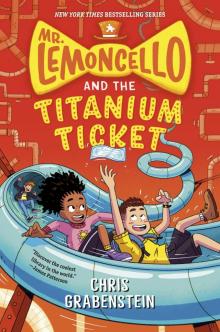 Mr. Lemoncello and the Titanium Ticket
Mr. Lemoncello and the Titanium Ticket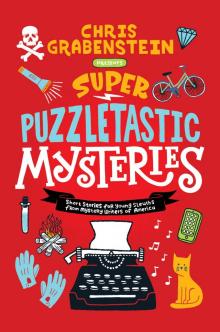 Super Puzzletastic Mysteries
Super Puzzletastic Mysteries Sandapalooza Shake-Up
Sandapalooza Shake-Up Welcome to Wonderland #4
Welcome to Wonderland #4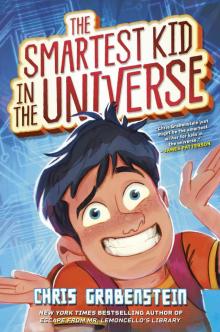 The Smartest Kid in the Universe
The Smartest Kid in the Universe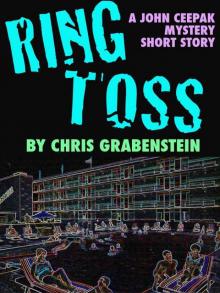 RING TOSS A John Ceepak Mystery Short (The John Ceepak Mysteries)
RING TOSS A John Ceepak Mystery Short (The John Ceepak Mysteries)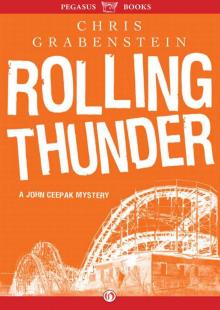 Rolling Thunder (John Ceepak Mystery)
Rolling Thunder (John Ceepak Mystery) Don't Call Me Christina Kringle
Don't Call Me Christina Kringle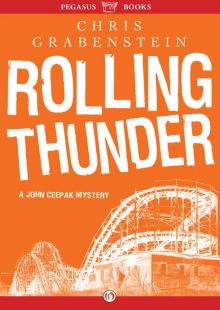 Rolling Thunder
Rolling Thunder The Crossroads
The Crossroads Hell Hole
Hell Hole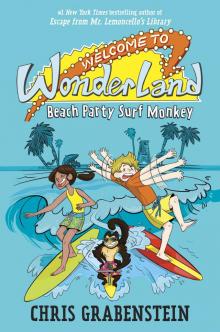 Beach Party Surf Monkey
Beach Party Surf Monkey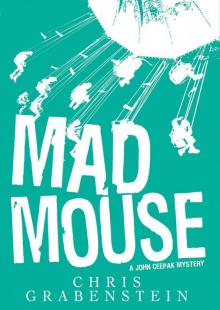 Mad Mouse: A John Ceepak Mystery (The John Ceepak Mysteries)
Mad Mouse: A John Ceepak Mystery (The John Ceepak Mysteries)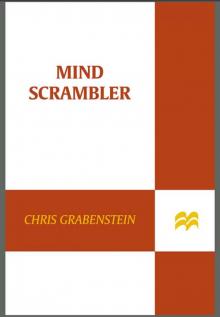 Mind Scrambler
Mind Scrambler Home Sweet Motel
Home Sweet Motel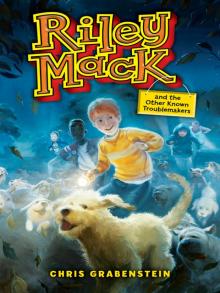 Riley Mack and the Other Known Troublemakers
Riley Mack and the Other Known Troublemakers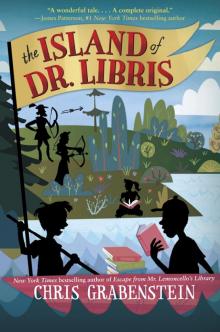 The Island of Dr. Libris
The Island of Dr. Libris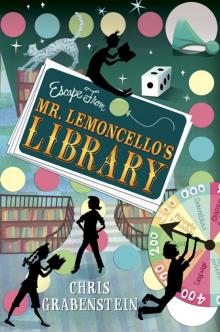 Escape From Mr. Lemoncello's Library
Escape From Mr. Lemoncello's Library The Black Heart Crypt
The Black Heart Crypt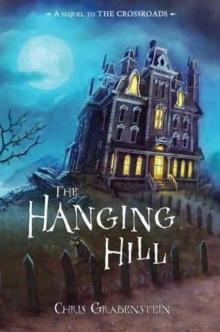 The Hanging Hill
The Hanging Hill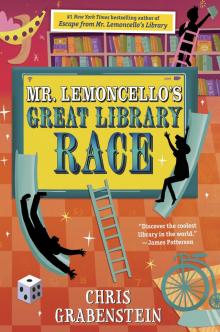 Mr. Lemoncello's Great Library Race
Mr. Lemoncello's Great Library Race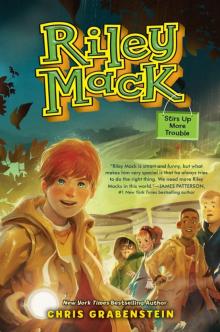 Riley Mack Stirs Up More Trouble
Riley Mack Stirs Up More Trouble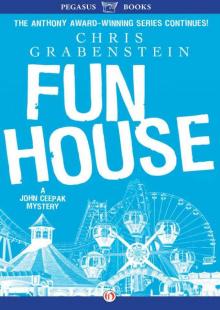 Fun House (John Ceepak Mystery)
Fun House (John Ceepak Mystery)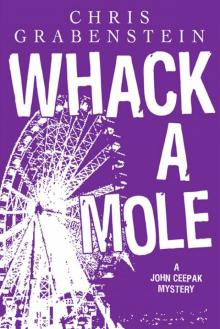 Whack A Mole: A John Ceepak Mystery (The John Ceepak Mysteries)
Whack A Mole: A John Ceepak Mystery (The John Ceepak Mysteries)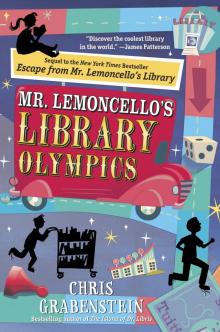 Mr. Lemoncello's Library Olympics
Mr. Lemoncello's Library Olympics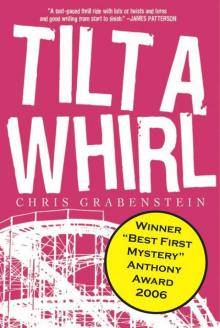 Tilt-a-Whirl jc-1
Tilt-a-Whirl jc-1 The Explorers’ Gate
The Explorers’ Gate The Smoky Corridor
The Smoky Corridor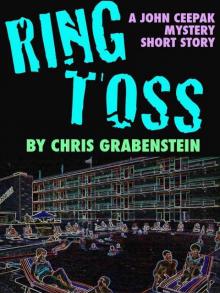 Ring Toss (john ceepak)
Ring Toss (john ceepak)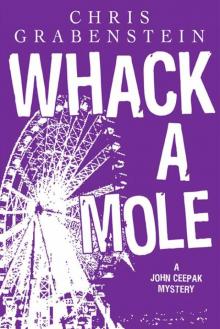 Whack A Mole jc-3
Whack A Mole jc-3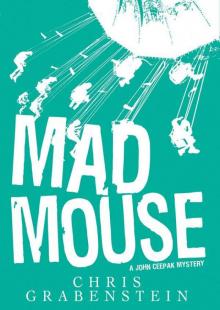 Mad Mouse js-2
Mad Mouse js-2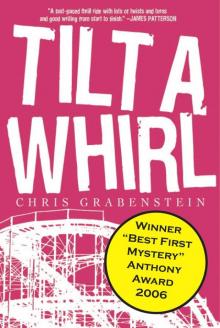 Tilt-a-Whirl (The John Ceepak Mysteries)
Tilt-a-Whirl (The John Ceepak Mysteries) Free Fall
Free Fall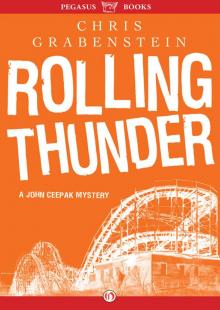 Rolling Thunder jc-6
Rolling Thunder jc-6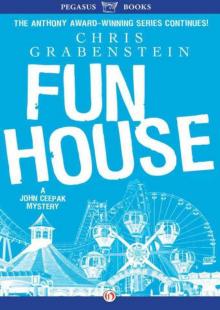 Fun House jc-7
Fun House jc-7